![]() For many, sporting or recreation events are some of the highlights of their life. Coaches, physical therapists, trainers, and PE teachers enrich the lives of student-athletes and those that have continued athletics into their adult years. Lifelong fans of athletic franchises or school athletic teams show up to every home game: rain or shine.
For many, sporting or recreation events are some of the highlights of their life. Coaches, physical therapists, trainers, and PE teachers enrich the lives of student-athletes and those that have continued athletics into their adult years. Lifelong fans of athletic franchises or school athletic teams show up to every home game: rain or shine.
And for some lucky few, athletics and recreation can also be a career.
In fact, athletics and recreation jobs are likely more common than you think. Nearly every K-12 school has a physical education teacher. Most high schools have a number of sports teams, with even more available at most universities. Fitness centers need trainers and physical therapists. And among large athletic organizations, there are scores of marketing, business, and logistics positions.
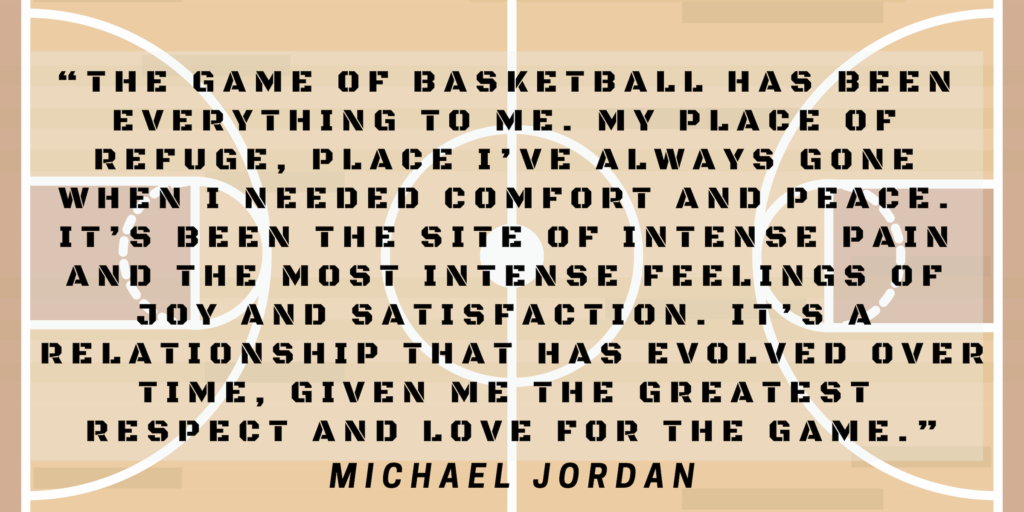
All we’re saying is that if you’re really into athletics or recreation, there’s likely a degree and career path out there that can make your passion a career.
Interested in learning what you can do with an athletics or recreation degree? Be sure to check out some of DegreeQuery’s FAQs on the topic below, or keep scrolling for more of our guide.
- The Best Online Masters in Recreation, Tourism, and Coaching
- What can I do with a degree in Recreational Therapy?
- What can I do with a degree in Parks & Recreation?
- What Degree Do I Need to Become an Exercise Physiologist?
- 15 Degrees That Are Perfect for Becoming Your Own Boss
- The 20 Best Jobs Without a 9-to-5 Work Schedule
- What degree do I need to become a Coach?
- What degree do I need to become an Athletic Trainer?
- What can I do with a degree in Sports Medicine?
- What can I do with a degree in Parks & Recreation?
- What degree do I need to become a Health Coach?
- What degree should I get to become a Personal Trainer?
- What master’s degree do I need to be an athletic director?
What Degrees Are Available in Athletics or Recreation?
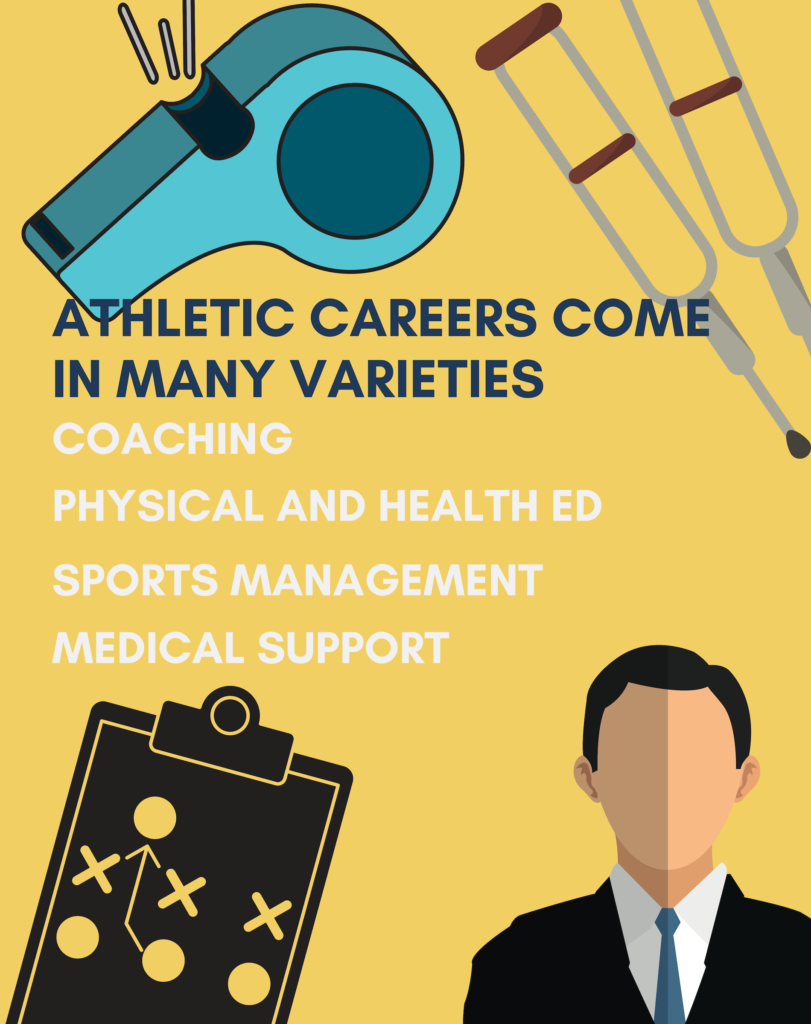
Broadly speaking there are four main categories of athletics or recreation degrees. The major groups of degrees related to these fields include:
- Coaching
- Physical and health education
- Sports and Recreation Management and Business
- Medical Support Staff for Athletics and Recreation
Coaching is what many people think of when they think of careers in athletics. Many people’s most memorable moments they had growing up with sports had to do with particularly gifted coaches. Coaches make a break a team and can lead to dynasties being born.
Not all coaches need degrees specifically related to coaching. Many professional certifications are available depending on the sport you’re coaching in. As coaches step into more serious roles, however, many coaches pursue an education in one of the following areas:
- Physical Education
- Sports Management
- Coaching
- Strength and Conditioning
All of the above degree programs are available at the bachelor’s and master’s levels, at least as concentrations within other programs.
Depending on what route future or current coaches take, degrees are available that are related to coaching in a number of fields. Education degrees include coaching, sports management approaches coaching through a managerial perspective, and degrees like kinesiology can lead to coaching from a body science perspective.
Slightly different from coaching, physical and health educators help to promote physical fitness and health through traditional educational settings or settings un-related to sports. Physical fitness and health education professionals may work in K-12 schools similarly to many coaches, or in fitness centers and medical hospitals.
There are generally two routes to becoming a physical or health educator through school. The first is to focus on a physical health-related profession. Kinesiology, physical therapy, and other healthcare-related fields often employ health educators to communicate with clients and patients.
The second route is to pursue an education degree with a focus on physical education. This approach is more similar to that of becoming a teacher. With physical education providers in public schools required to hold teacher licenses in their subject matter.
Education routes towards health and physical educator roles can be achieved at the bachelor’s and master’s level. In line with the two routes presented above, common degrees that may lead to this type of role include:
- Bachelor’s in Education with a focus on physical education
- Educational Master’s program with a focus on physical education
- Bachelor of Science in Nursing-Community Educator Track
- Bachelor’s in Kinesiology
- Master’s in Kinesiology
- Master’s in Athletic Training
- Among Others
Interested in pursuing a degree in education centered on athletics? Be sure to check out our guide to education degrees here.
Sports management jobs can take place on and off the field. Depending on the size and complexity of athletic organizations, there may be a “back office” where the organization is managed. Or, in the case of many smaller organizations, the head coach will also manage the finances, marketing, and decision making for the organization.
In either case, leaders of athletics and recreation organizations can benefit from business and management knowledge tailored to their field. Luckily, sports management degrees or business degrees with sports management concentrations are more available than ever.
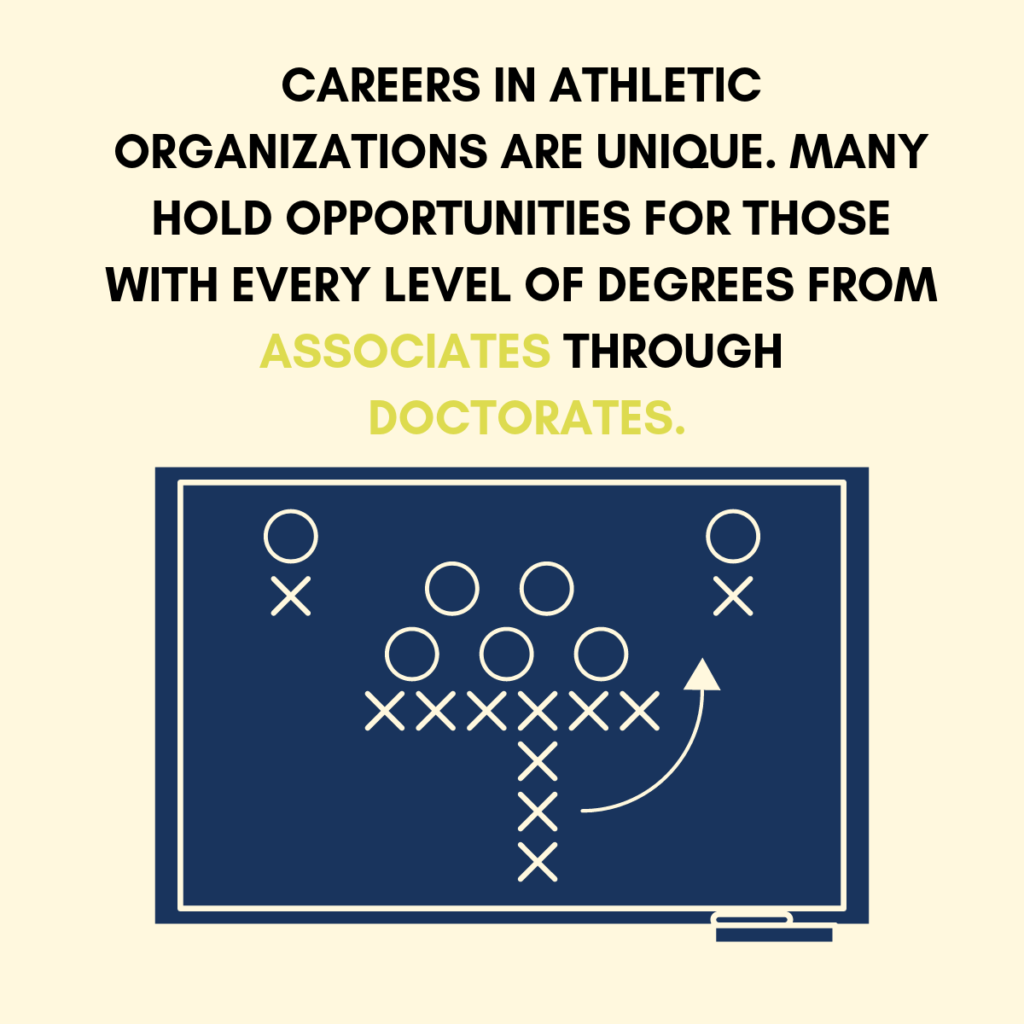
Bachelors in sports management degrees are similar to bachelor’s in business administration degrees with additional courses on sports settings. Along with general education requirements and a general business core, students often take classes include:
- Intro to Sports Management
- Sport Marketing
- Brand Management
- Sports Facilities Management
- Governance and Management in Sports Organizations
- Ethics in Sports
- And an internship
Masters-level degrees in sports management may be gained through a number of tracks, including specializations in MBA programs, as well as degrees title masters in sports management. Both degree types blend business and management courses with courses tailored to athletics settings.
Interested in pursuing a degree in business centered on athletics? Be sure to check out our guide to business degrees here.
For those looking to get into recreation management instead of sports management, a separate but closely related set of degrees are available. At the bachelor’s and master’s levels degrees in the following are good preparation for recreation management:
- Bachelor’s in hospitality management
- Bachelor’s in recreation management
- Master’s in hospitality management
- Master’s in recreation management
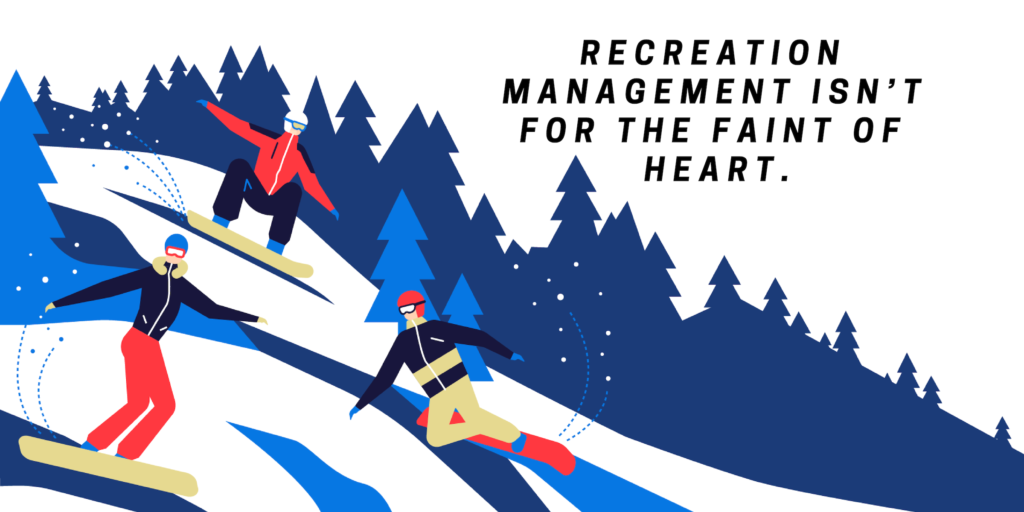
Recreation management is generally thought of as a subdiscipline of hospitality management. Recreation management, hospitality management, and sports management are all applied specialties within management degrees. As such, though one may be slightly more tailored to your location of employment, many of the core courses are shared.
In the case of recreation management, courses may be available in the management of golf clubs, eco-tourism resorts, or adventure guide businesses.
Our final group of athletics and recreation degrees help to prepare recipients for jobs as medical support staff for athletics and recreation. These jobs include:
- Physical therapy
- Nursing
- Kinesiologists
- Athletic Trainers
- And Dieticians
Though the routes to each of the above careers vary, they share a number of core courses at the undergraduate level. Courses including the following are shared among most medical support staff prerequisites:
- Human Anatomy and Physiology
- Pathophysiology
- Health Promotion and Education
- Ethics of patient care
Other than those, respective degrees are required for each. Physical therapists are required to hold a license and a Doctor of Physical Therapy degree. Physical therapy assistants, however, can gain employment with an associates degree.
Nurses that work in athletics or recreation settings may run the gamut between highly specialized and not. Nursing degrees are available at the associate’s through doctoral levels. Though it is unlikely that nurses with masters or above are active in sports settings except for at the highest levels.
Kinesiologists study movement and the human body. They often find employment as trainers or coaches. There are specific degrees for kinesiology, however. At the bachelor’s level students may study the following in a kinesiology degree:
- Emergency response care
- Motor skills development
- Nutrition
- Human anatomy
- Weight training
- Athletic injuries
At the master’s level, the following courses are typically common:
- Qualitative motion analysis
- Advanced exercise physiology
- Advanced nutrition
- Statistics
- Advanced teaching methods
- Aging physiology
If you think you may be interested in any of the above medical support careers related to athletics, be sure to check out DegreeQuery’s guides on how to obtain degrees in nutrition, nursing, and massage.
We know we’ve covered a wide range of fields in the above section. But that’s just because there are many, many ways to become involved with athletics and recreation in your career. Have a question we haven’t answered yet? Check out our athletics and recreation degree FAQs below:
- What degree do I need to be a Kinesiologist?
- What degree do I need to become a Coach?
- What degree do I need to become an Athletic Trainer?
- What can I do with a degree in Sports Medicine?
- What can I do with a degree in Parks & Recreation?
- What degree do I need to become a Health Coach?
- What degree should I get to become a Personal Trainer?
- How to Become a Personal Trainer: What Degree Should I Get?
- What master’s degree do I need to be an athletic director?
Can I gain an athletics or recreation degree online
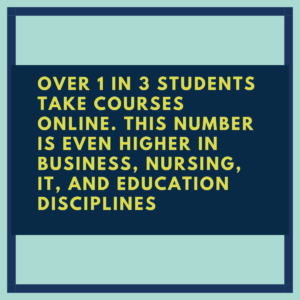
Athletics and recreation careers are tactile, in-person, and physical. That doesn’t mean that you can’t complete your education in an athletics or recreation discipline fully online though.
While not every academic field listed above can be completed online, degrees in the following disciplines are routinely offered online:
- Sports Management
- Recreation Management
- Coaching
- Physical Education Endorsements
Just because a degree is offered online, doesn’t mean online is the right fit for you. Keep in mind some of the below pros and cons of online education when you are choosing between programs.
Benefits of online programs in sports management and related fields:
- Lower fees than in-person programs
- No commute required
- No need to move for school
- Log onto class when you need
- The same degree you gain “in-person”
Downsides of online programs in sports management and related fields:
- Online often requires more self motivation
- No access to sports facilities online
- Harder to form meaningful relationships with faculty and classmates
What Can I Do With an Athletics or Recreation Degree?
As we have discussed some above, there are many different degrees related to athletics and recreation. Many can be used to achieve the same goals, while some athletics positions require very specific schooling.
Below we’ll walk through some of the most common athletics and recreation careers grouped by the degree required by many jobs of that type.
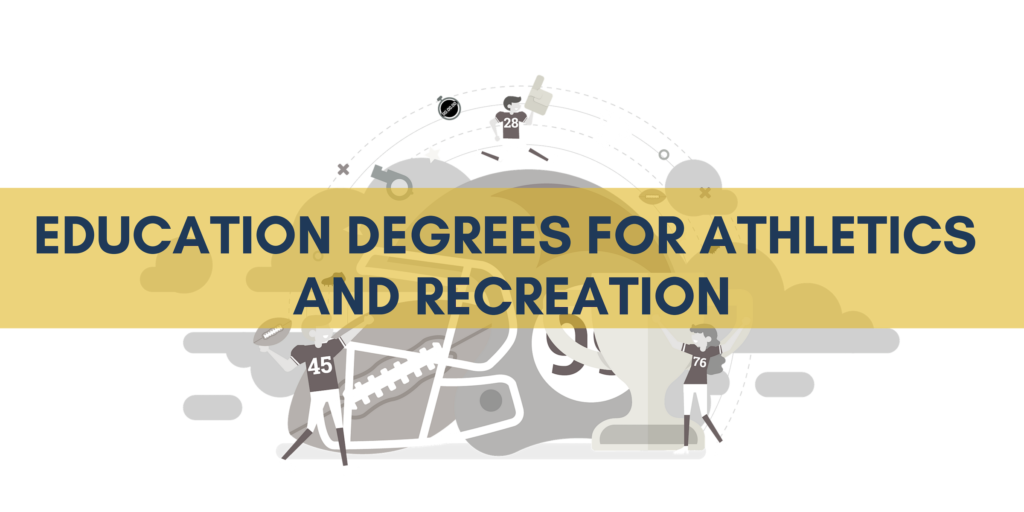
First off, let’s look at education degrees. Many coaches are employed by K-12 schools, and most K-12 schools also have health and physical educators. Working in K-12 public schools requires a teaching license.
Licensure is normally acquired as part of a bachelor’s in education degree, master’s in education degree, or an alternative track to licensing. Many coaches pursue bachelor’s or master’s in education fields that focus on the subject matter area of physical education or coaching.
Coaching positions in K-12 schools vary greatly depending on the size of the school, the athletics budget, and what age the coach is working with. Many elementary and middle school coaches also teach classes at school. At some large high schools with well-funded athletics programs, coaches of large programs will work 100% of their time as a coach.
As one may imagine, salaries vary widely for K-12 coaches. A cross country coach for a small middle school likely does not have as much coaching to do as a football coach at a 5,000 student high school.
In many districts that do not have large athletics programs, coaches may be primarily employed as teachers with an additional stipend added to their salary for coaching duties. Common stipend amounts range from $10,000-$30,000 a year in addition to a teaching salary.
For popular sports like football at large schools, salaries can climb much higher. For example, the average high school football coach salary in the State of Texas is $98,668 a year. Depending on how popular your sport is, how well funded your school is, and the priorities of your district, you should scale your expectations up or down regarding salary. That is to say, K-12 coaching salaries vary widely.
Physical education teachers employ physical learning and health lessons to students in a class environment. These teachers hold a teacher’s license in their subject area and are paid similar rates to normal classroom teachers.
The average salary nationwide for physical education teachers is $51,380. Additionally, many P.E. teachers supplement their income with school coaching gigs.
Interested in pursuing a degree in education centered on athletics? Be sure to check out our guide to education degrees here.
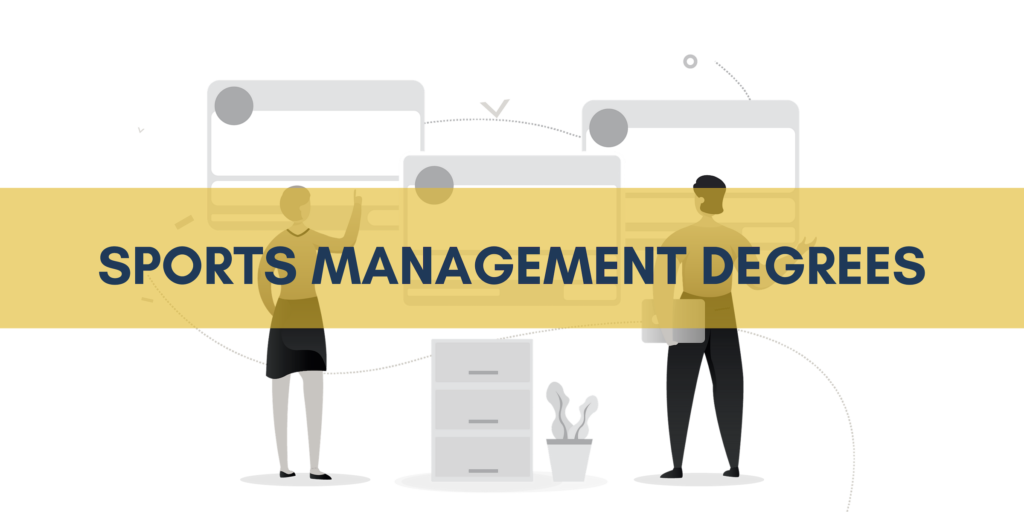
Our second section of athletic jobs center around sports management. Those with sports management degrees are in-demand in many collegiate and professional sports settings, as well as at corporate headquarters of fitness centers and other athletic facilities.
Many sports management careers mirror typical business careers. Any large sports organization is likely to have a marketing division, accounting division, financial advisers, logistical managers, as well as general managers.
Though there are obviously fewer opportunities for business careers in sports than in general business settings, seasoned professionals in their field may be able to find transitioning to a sport’s setting easier.
Average salaries for sports management jobs include the following:
- Marketing Manager Professional Sports: $70,036
- Financial Manager Professional Sports: $90,000
- Accounting Manager Professional Sports: $76,000
- Logistics Manager Professional Sports: $85,000
- General Manager NFL: $2,000,000
Interested in pursuing a degree in business centered on athletics? Be sure to check out our guide to business degrees here.
The separate but related field of recreation management also holds a wide range of employment opportunities. Many recreation areas are more similar to hospitality settings with planned events than they are to sporting arenas. Examples include trips provided by wilderness guides, water sport rentals and guides, ski resorts, and many others. Many of these activities, though outdoors and sports related, may be located in resort settings, vacation destinations, or national parks.
A small list of the available jobs related to recreation includes the following:
- Ski Instructor
- White Water Rafting Guide
- Wilderness Guide
- Fishing Guide
- Scuba Instructor
- Lifeguard
- As well as managerial positions related to each
Generally speaking, there are two educational paths towards recreation jobs. The first is for most of the guide and instructor jobs listed above. In most of these areas, there’s no traditional education requirement. Though there are often professional certifications. You’ve likely heard of certified scuba instructors or white water rafting guides.
The second group way in which education plays into recreation area jobs is through those that want to start their own recreation business, or are involved with the management of an existing recreation business. For these individuals, recreation management degrees may be a great choice.
Regardless of educational requirements, there aren’t many earnings guides for recreation-centered positions. Many recreational jobs are entrepreneurial by nature. And while there may be some super luxury fishing trip guides out there, there are also likely others for whom it’s just a part-time job.
Don’t let the lack of information on recreation salaries get you down though. If anything, all of the above options for employment in recreation areas should show you a number of possibilities. And if you aren’t ready to take the plunge to grab your dream job in recreation, you can always start on a recreation management degree or related certification.
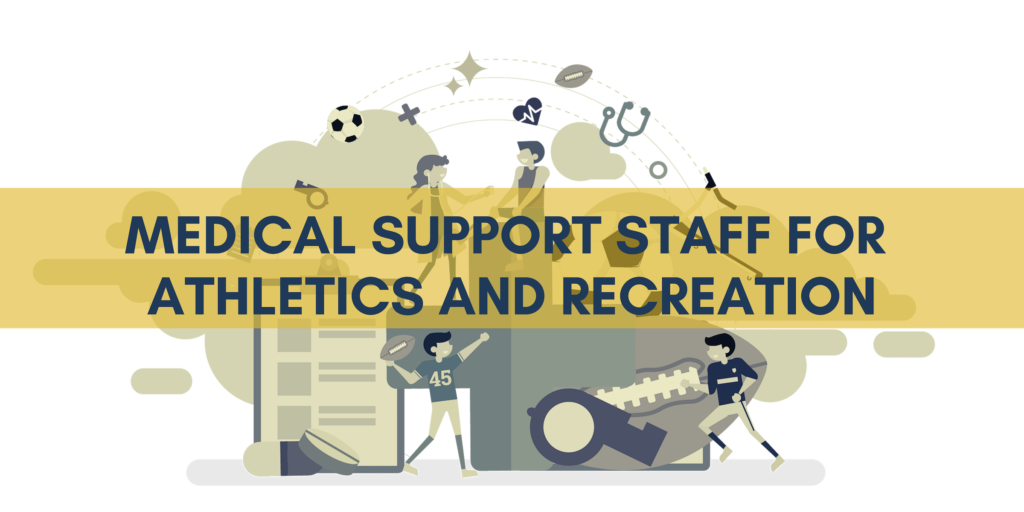
Our final group of athletics and recreation-related careers are centered around medical support. These positions commonly include:
- Physical therapists
- Trainers
- Massage Therapists
- Nurses
- Dieticians
Some of the above positions may work primarily with a single team or organization such as a university. Others may be in private practice and be the sole practitioner in a discipline for an athletic team.
Routes to the above careers vary, with nurses, trainers, and massage therapists often requiring a bachelor’s degree, dieticians requiring a master’s degree, and physical therapists requiring a doctorate. This is evidenced somewhat in their pay.
Average salaries for medical support positions in athletics or recreation include the following:
- Physical Therapist: $84,020
- Athletic Trainer: $44,670
- Massage Therapist: $38,040
- Registered Nurses: $67,490
- Registered Dieticians: $51,107
If you think you might be interested in any of the above medical support careers related to athletics, be sure to check out DegreeQuery’s guides on how to obtain degrees in nutrition, nursing, and massage.
Didn’t find an answer to your athletic and recreation degree questions? Check out DegreeQuery’s additional FAQs on the subject below:
- What can I do with a degree in Recreational Therapy?
- What can I do with a degree in Parks & Recreation?
- What Degree Do I Need to Become an Exercise Physiologist?
- 15 Degrees That Are Perfect for Becoming Your Own Boss
- The 20 Best Jobs Without a 9-to-5 Work Schedule
- What degree do I need to be a Kinesiologist?
- What degree do I need to become a Coach?
- What degree do I need to become an Athletic Trainer?
- How do I become a Sport Psychologist?
- What can I do with a degree in Sports Medicine?
- What can I do with a degree in Parks & Recreation?
- What degree do I need to become a Health Coach?
- What degree should I get to become a Personal Trainer?
- What master’s degree do I need to be an athletic director?
